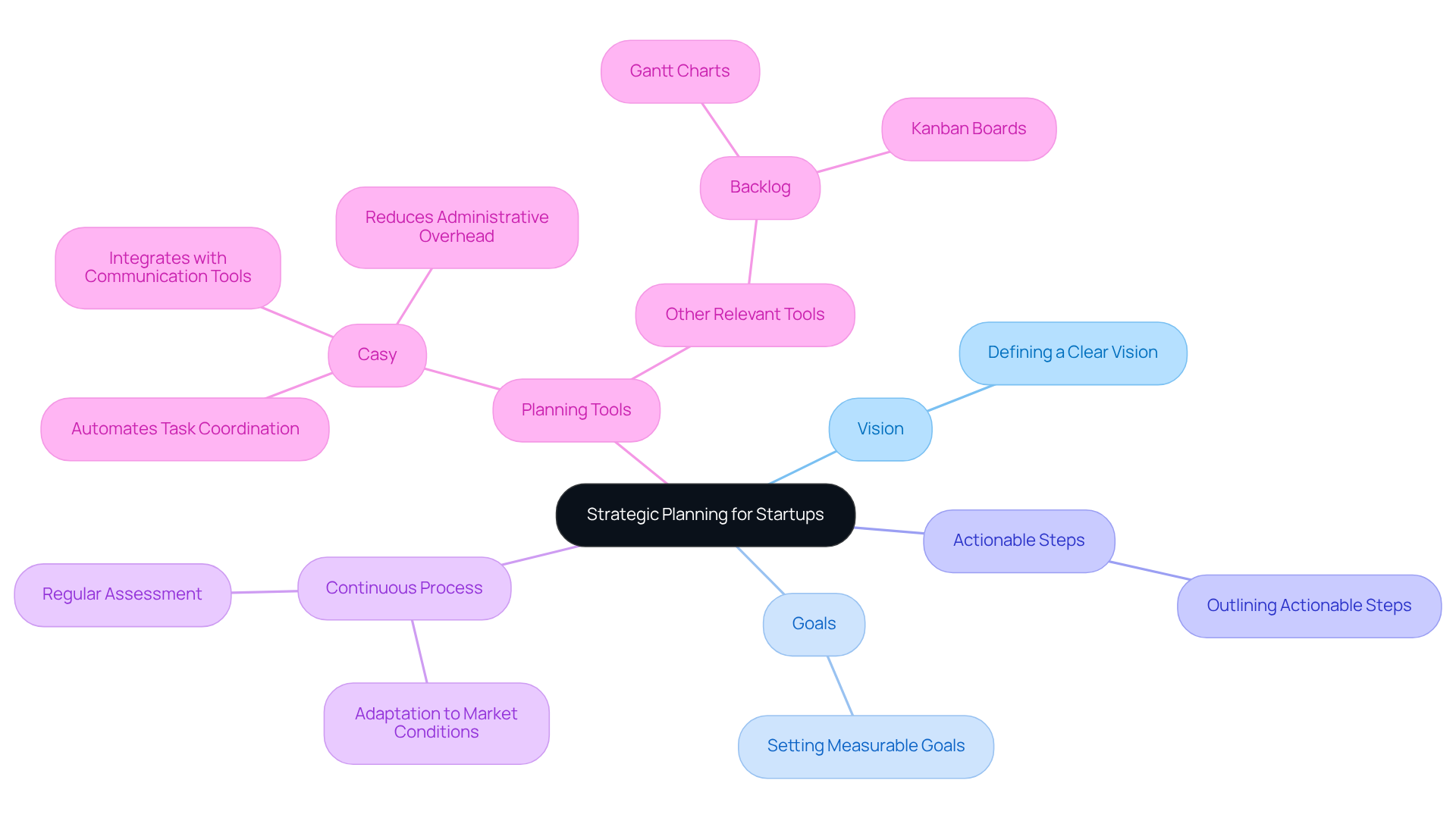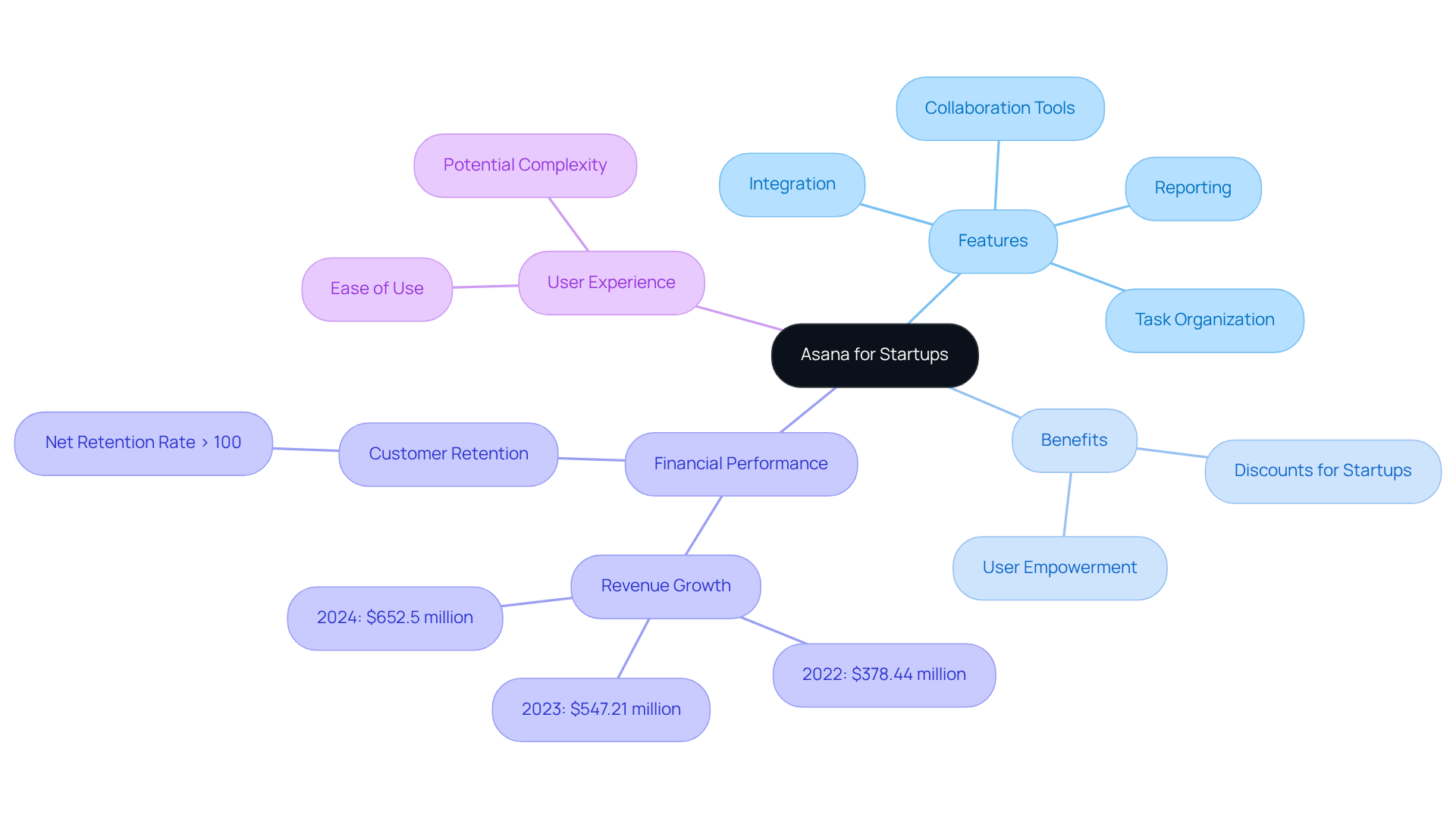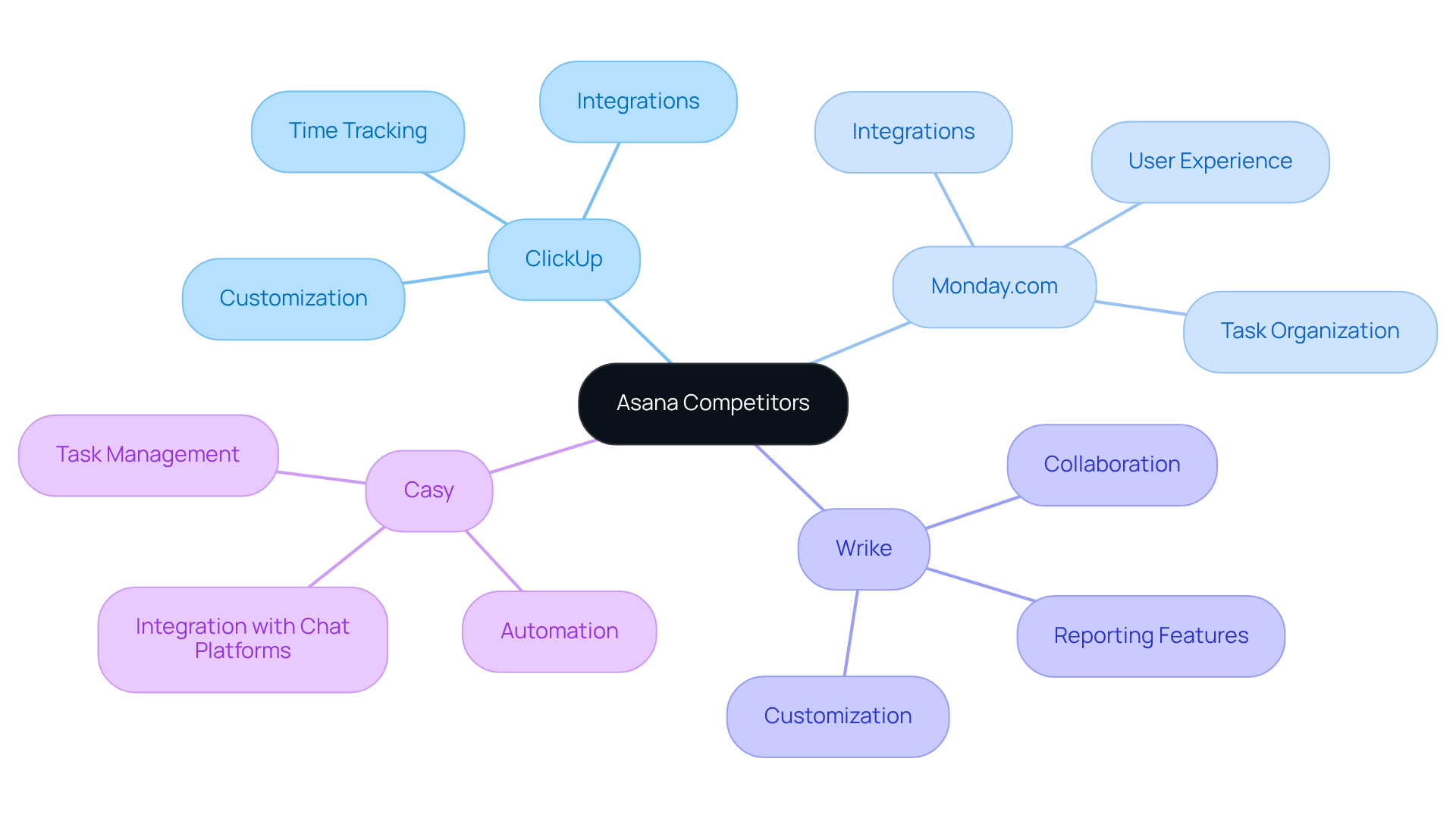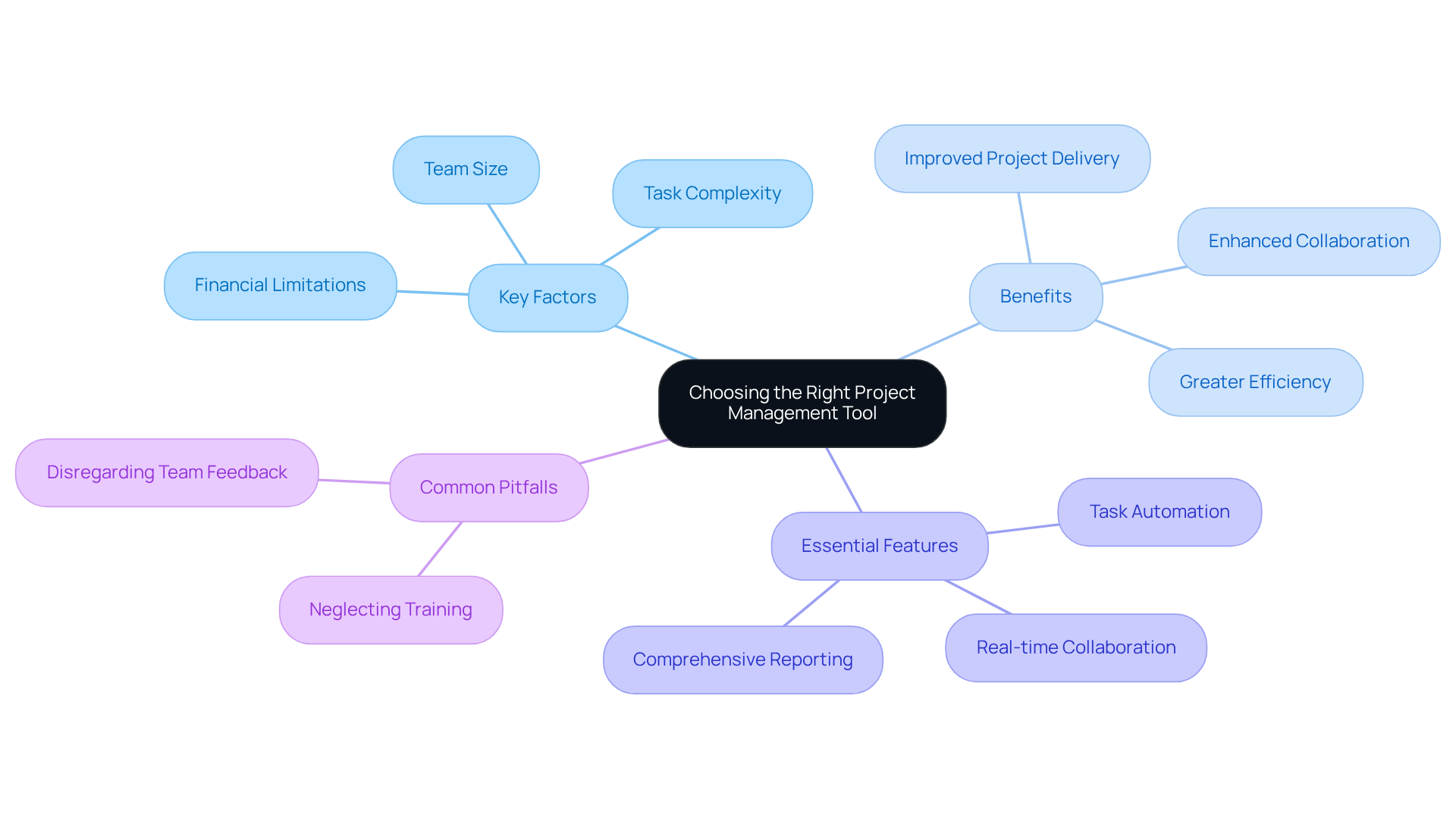Overview
This article provides a comprehensive comparison of Asana and its competitors, aiming to identify the most suitable project management tools for startups. While Asana boasts robust features tailored for new businesses, alternatives such as ClickUp, Monday.com, and Casy offer unique advantages that may better align with specific startup needs.
It is crucial to evaluate these tools based on key factors, including:
- Customization
- User experience
- Integration capabilities
By doing so, startup founders can make informed decisions that drive their success.
Introduction
Navigating the startup landscape requires more than just a great idea; it demands strategic planning and the right tools to execute that vision. Asana has emerged as a popular choice among new ventures, offering a robust suite of features designed to enhance productivity and streamline operations. Yet, with a plethora of alternatives available, startups face the challenge of selecting a project management tool that aligns with their unique needs.
Which platform will not only facilitate daily tasks but also drive long-term success in a competitive environment? This article delves into the key competitors of Asana, comparing their features and benefits to empower startups in making informed decisions regarding their project management strategies.
Understanding Strategic Planning for Startups
Strategic planning for new ventures is essential. It begins with defining a clear vision, setting measurable goals, and outlining actionable steps to achieve those goals. This is not a one-time task; it is a continuous process that requires regular assessment and adaptation to ever-changing market conditions. Startups encounter unique challenges, such as limited resources and the urgent need for rapid growth, making effective strategic planning even more critical.
How can new businesses navigate these complexities? By incorporating planning instruments into their strategic approach. Tools like Casy can automate task coordination, enabling teams to focus on strategic initiatives rather than getting bogged down by administrative overhead. This alignment of daily operations with long-term objectives optimizes workflows, boosts communication, and enhances overall efficiency.
In essence, effective strategic planning empowers startups to not only survive but thrive in competitive landscapes. Are you ready to elevate your strategic planning process and drive your startup towards success?

Exploring Asana: Features and Benefits for Startups
Asana presents a comprehensive suite of features tailored to meet the unique needs of startups, encompassing robust task organization, tracking, and collaboration tools. Its intuitive interface streamlines the process of task creation, deadline setting, and responsibility assignment, making it accessible for teams of all sizes. Startups can leverage various task views—such as lists, boards, and calendars—that enhance workflow visualization effectively. Moreover, Asana's seamless integration with a variety of third-party applications enhances its functionality, allowing teams to customize their management experience to align with specific requirements.
The platform's advanced reporting capabilities deliver critical insights into team performance and project progress, which are vital for new businesses aiming to optimize their operations. Notably, Asana has been acknowledged for its capacity to empower teams, boasting a dollar-based net retention rate exceeding 100%, a clear indicator of strong customer loyalty. Furthermore, Asana's revenue surged by 19%, rising from US$547.21 million in 2023 to US$652.5 million in 2024, underscoring its growth and reliability as a resource for emerging businesses.
Additionally, the Asana for Startups initiative offers discounts of up to 80% for qualifying early-stage businesses, addressing the financial challenges that many new ventures face. However, some users may perceive the extensive features as overwhelming, particularly if they seek a more straightforward solution. This balance of powerful features and potential complexity renders Asana an appealing choice for new businesses aiming to streamline their workflow processes.

Comparing Asana with Competitors: Key Alternatives for Startups
When comparing Asana competitors, several alternatives stand out for startups. Tools like ClickUp and Monday.com offer similar functionalities but vary in customization and user experience. ClickUp is recognized for its adaptability, enabling users to customize workflows extensively. In contrast, Monday.com boasts an attractive interface that streamlines task organization.
Wrike excels in cross-team collaboration and offers advanced reporting features, making it suitable for larger teams. Meanwhile, Casy emerges as an innovative project management solution that automates task creation and integrates seamlessly with chat platforms. This reduces the need for manual input, a unique feature that can significantly boost productivity for rapidly growing companies.
Ultimately, Asana competitors each have their own advantages and disadvantages. The decision relies on the particular needs and preferences of the new business. What challenges do you face in project management? Consider how these tools can address your specific requirements and drive your startup's success.

Identifying Startup Needs: Choosing the Right Project Management Tool
Selecting the right resource for a new business requires a thorough evaluation of several key factors, including team size, task complexity, and financial limitations. A 2025 survey revealed that 80% of startups employing project management resources experienced improved project delivery, enhanced team collaboration, and greater efficiency.
Startups must prioritize resources that provide scalability, user-friendliness, and seamless integration with existing workflows. Key features such as:
- Task automation
- Real-time collaboration
- Comprehensive reporting capabilities
are essential for increasing productivity. Moreover, evaluating the level of customer support and training provided by the software is critical, as these factors can greatly impact the success of the implementation process.
Common pitfalls to avoid include:
- Neglecting training
- Disregarding team feedback
which can undermine the effectiveness of the selected tool. By ensuring that their choice of project management software aligns with their strategic goals and operational requirements, new businesses can foster a more efficient and collaborative work environment, ultimately boosting their chances of success.
Tools like Casy, which integrates with chat platforms and utilizes methodologies such as OKRs and the Eisenhower Matrix, illustrate how startups can harness technology to optimize their processes.

Conclusion
Effective strategic planning is fundamental for startups aiming to navigate the complexities of their environments and achieve sustainable growth. By setting clear objectives and utilizing the right tools, such as Asana and its competitors, new businesses can streamline their operations and enhance productivity. The choice of project management software directly impacts a startup's ability to align daily tasks with long-term goals, making informed decisions crucial.
Throughout the article, key insights emerged regarding the features and benefits of Asana, alongside comparisons with other project management tools like ClickUp, Monday.com, and Casy. Asana's robust capabilities, including task automation, advanced reporting, and seamless integrations, position it as a valuable asset for startups. However, understanding the unique strengths of its competitors allows businesses to tailor their choice based on specific needs, ultimately fostering a more productive work environment.
In conclusion, startups must carefully assess their project management requirements and explore the diverse options available to them. Emphasizing the importance of strategic planning and the right tools can lead to improved collaboration, efficiency, and project delivery. By leveraging these insights and making informed choices, new ventures can not only survive but thrive in their respective markets.
Frequently Asked Questions
Why is strategic planning important for startups?
Strategic planning is essential for startups as it helps define a clear vision, set measurable goals, and outline actionable steps to achieve those goals, enabling them to navigate unique challenges effectively.
What challenges do startups face that make strategic planning critical?
Startups face challenges such as limited resources and the urgent need for rapid growth, making effective strategic planning crucial to their success.
How should startups approach strategic planning?
Startups should view strategic planning as a continuous process that requires regular assessment and adaptation to changing market conditions.
What tools can assist startups in their strategic planning efforts?
Tools like Casy can help automate task coordination, allowing teams to focus on strategic initiatives and improve overall efficiency.
What are the benefits of effective strategic planning for startups?
Effective strategic planning empowers startups to align daily operations with long-term objectives, optimizing workflows, boosting communication, and enhancing overall efficiency, ultimately helping them thrive in competitive landscapes.




